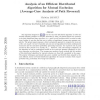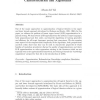346 search results - page 51 / 70 » Logical omniscience as a computational complexity problem |
CONPAR
1992
13 years 11 months ago
1992
The algorithm designed in [12, 15] was the very first distributed algorithm to solve the mutual exclusion problem in complete networks by using a dynamic logical tree structure as...
AAAI
2004
13 years 9 months ago
2004
From a computational perspective, there is a close connection between various probabilistic reasoning tasks and the problem of counting or sampling satisfying assignments of a pro...
AI
2005
Springer
13 years 7 months ago
2005
Springer
One of the major approaches to approximation of logical theories is the upper and lower bounds approach introduced in (Selman and Kautz, 1991, 1996). In this paper, we address the...
DAC
2006
ACM
14 years 8 months ago
2006
ACM
Ever-growing complexity is forcing design to move above RTL. For example, golden functional models are being written as clearly as possible in software and not optimized or intend...
ACSAC
2003
IEEE
14 years 27 days ago
2003
IEEE
In-depth analysis of network security vulnerability must consider attacker exploits not just in isolation, but also in combination. The general approach to this problem is to comp...


